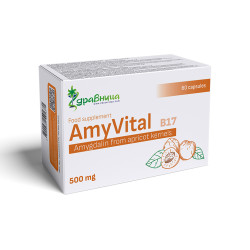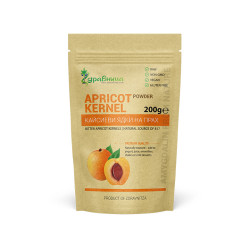In the world of natural supplements, amygdalin - also known as laetrile or vitamin B17 - has long been a subject of passionate debate. Supporters praise it for its wide range of health benefits, while critics warn about its potential toxicity.
In this article, we’ll explore in detail what amygdalin is, how it’s used today, its natural sources, the evidence-based benefits and risks, and what science actually says about its use against cancer.
What Is Amygdalin - History and Chemistry
Discovery and Definition
Amygdalin is a naturally occurring cyanogenic glycoside - a molecule that can release hydrogen cyanide (HCN) when metabolized. Historically, it was discovered in 1830 by French chemists Pierre-Jean Robiquet and Boutron-Charlard, who isolated it from bitter almonds.
In the 20th century, Ernst T. Krebs Jr., an American biochemist and alternative health promoter, introduced a semi-synthetic form called laetrile and branded it as vitamin B17 - though, biochemically, it is not a true vitamin, as it is not essential to human metabolism.
Krebs and his followers claimed amygdalin had anticancer properties, but these claims remain scientifically unproven and controversial.
Chemical Behavior and Mechanism
Amygdalin’s structure includes benzaldehyde, two glucose molecules, and mandelonitrile. When broken down enzymatically (by β-glucosidase), it can release benzaldehyde and hydrogen cyanide (HCN).
This potential for cyanide release is central to both its hypothesized therapeutic action and its toxicity risk.
Natural Sources of Amygdalin
Amygdalin naturally occurs in seeds and kernels of many plants, especially from the Rosaceae family. Common sources include:
- Bitter almonds - very high concentration
- Apricot kernels - frequently used in traditional and alternative medicine
- Peach kernels - variable content depending on variety and region
- Cherry, plum, and sour cherry pits - contain smaller amounts
- Apple seeds - low concentration
The amygdalin content varies widely based on the plant variety, climate, cultivation method, and processing.
Scientific studies often use HPLC/UV analysis to quantify amygdalin levels in natural materials.
Potential Health Benefits - What Research Shows
When discussing “benefits,” it’s important to emphasize that most data come from in vitro (cell) or animal studies, not from human clinical trials. Still, several biological effects have been reported:
1. Antioxidant, Anti-inflammatory, and Immunomodulatory Effects
Demonstrated antioxidant activity, reducing oxidative stress in lab studies.
May inhibit PGE₂ and NO synthesis through COX-2 and iNOS suppression, showing anti-inflammatory potential.
Some studies suggest immune regulation, including effects on T-regulatory cells and cytokines.
Animal research indicates analgesic (pain-relieving) effects, possibly linked to benzaldehyde formation.
2. Anticancer Activity (in vitro and Animal Models)
Lab studies show cytotoxic effects on cancer cell lines - lung, breast, colon, bladder, and others.
Mechanisms may include apoptosis induction, cell-cycle inhibition, and modulation of Bcl-2 family proteins (↑Bax, ↓Bcl-2).
Newer experimental methods use nanoparticle delivery systems (e.g., alginate-chitosan nanoparticles) to improve targeting and reduce toxicity.
Despite promising in vitro data, no reliable human evidence supports its effectiveness against cancer.
3. Other Potential (Weakly Supported) Effects
Some small, low-quality studies suggested temporary blood pressure reduction after apricot kernel intake, but results are unreliable.
Hypothesized mild analgesic or supportive effects in chronic conditions - still unproven.
Summary of Evidence
Amygdalin shows potential anticancer activity in lab and animal research.
Human clinical evidence is lacking and inconclusive.
Cyanide toxicity remains the primary health concern.
Major health authorities (e.g., NCI, Cancer Research UK) state there is no scientific proof that amygdalin treats or prevents cancer.
Amygdalin and Cancer - Scientific Perspective
The U.S. National Cancer Institute (NCI) reports that laetrile has shown minimal antiproliferative effects in animals and no proven benefit in human studies.
In a small phase I trial (6 patients), mild side effects were observed but no meaningful clinical improvement.
A larger study (~175 patients) found no statistical evidence of improved survival or slowed disease progression.
Regulatory reviews emphasize the absence of well-controlled, reliable human trials supporting amygdalin as a cancer therapy.
Recommended Doses and Safety Limits
There is no officially recognized safe daily dose of amygdalin in either the EU or the U.S.
Scientific data suggest that doses around 0.6-1.0 mg/kg body weight may not cause immediate toxicity in animal models, but these findings cannot be directly applied to humans.
The EFSA (European Food Safety Authority) set an acute reference dose for cyanide at 20 µg per kilogram of body weight, which can be exceeded by consuming as few as 2-3 raw apricot kernels.
Therefore, any supplementation should be approached with extreme caution and under medical supervision.
Sources of Information
EFSA (European Food Safety Authority)
FDA (U.S. Food and Drug Administration)
National Cancer Institute (NCI, USA)
Memorial Sloan Kettering Cancer Center (MSKCC)
BfR (German Federal Institute for Risk Assessment)
PubMed / PMC / MDPI scientific journals
Cancer Research UK





